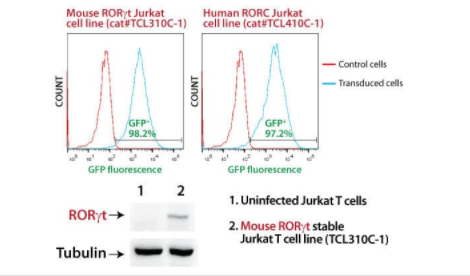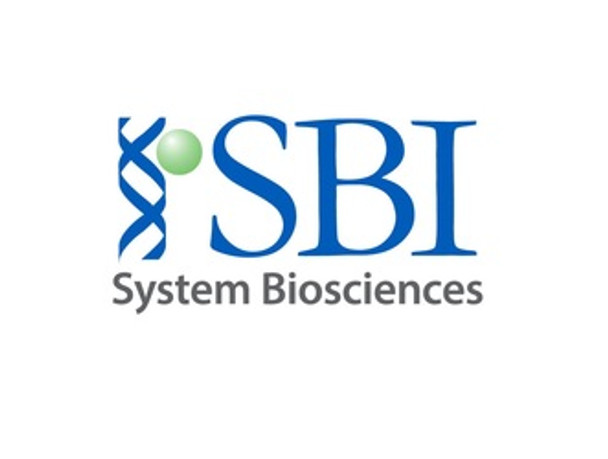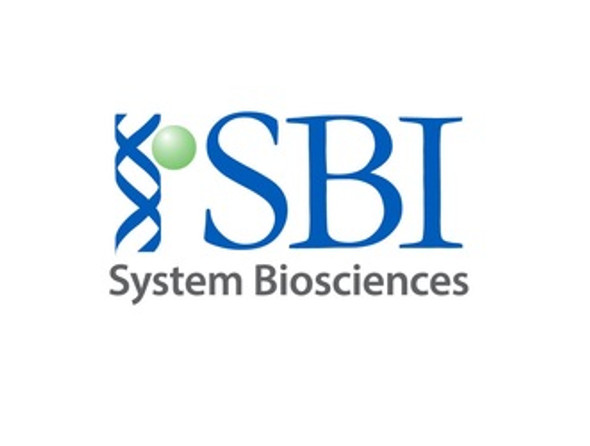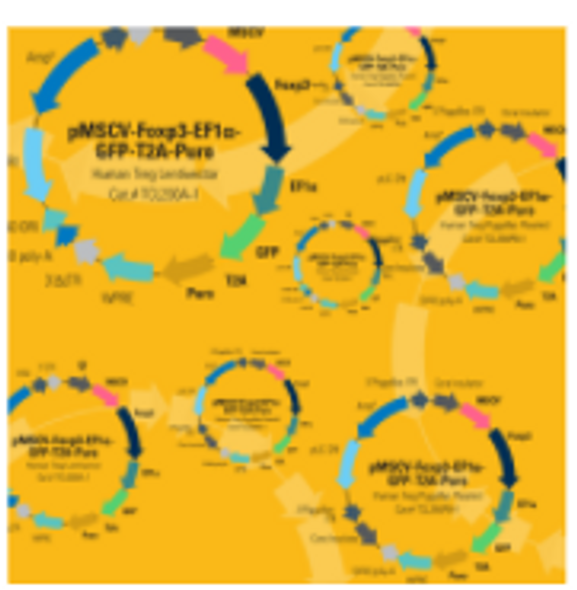System Biosciences
MSCV-Human RORgt-EF1-GFP-T2A-Puro Stable Jurkat cell line (Puro resistant)
- SKU:
- TCL410C-1
- Availability:
- Usually Shipped in 5 Working Days
- Size:
- 5 x 10^6 cells/ml
- Shipping Temperature:
- Dry Ice
Description
MSCV-Human RORgt-EF1-GFP-T2A-Puro Stable Jurkat cell line (Puro resistant). Cat# TCL410C. Supplier: SBI System Biosciences

Overview
Study the balance of T cell dynamics in autoimmunity, inflammation, and cancer
Simplify your studies of T cell dynamics with SBI’s ready-to-use, pre-built Treg and Th17 vectors and cell lines. With pMSCV-Human RORC-EF1α-GFP-T2A-Puro for RORC Overexpression, you can choose between three different ways to study RORC overexpression from the MSCV promoter for strong expression in hematopoietic and stem cells:
Lentivector-based for transfection-resistant cell lines
Create stable RORC-overexpressing cell lines by integrating the pMSCV-Human RORC-EF1α-GFP-T2A-Puro expression cassette into the genome using SBI’s highly regarded and reliable lentivector technology. With our lentivector technology, you can take advantage of our high-titer lentivector packaging system to efficiently deliver your RORC overexpression cassette to cells using transduction—great for transfection-resistant cell lines.

PiggyBac Transposon-based* for infection-resistant cell lines
Create stable RORC-overexpressing cell lines by integrating the pMSCV-Human RORC-EF1α-GFP-T2A-Puro expression cassette into the genome with SBI’s easy and consistent PiggyBac Transposon System. With our PiggyBac Transposon System, you get easy and consistent transgenesis for RORC overexpression in infection-resistant cell lines.

Pre built Jurkat cell line to save time and labor
Quickly get your Treg studies off the ground with our pre-built Jurkat cell line that already has the pMSCV-Human RORC-EF1α-GFP-T2A-Puro expression cassette integrated into the genome. We transduced Jurkat cells with the pMSCV-Human RORC-EF1α-GFP-T2A-Puro expression cassette and have validated RORC overexpression, so you don’t have to—just culture cells and start your studies.
*Customer AgreementsAcademic customers can purchase PiggyBac Transposon System components for internal research purposes for indefinite use, whereas commercial customers must sign a customer agreement for a six-month, limited-use license to test the technology.
For end user license information, see the following:
- Academic Customers—End-User License Information
- Commercial Customers—End-User License Information
* SBI is fully licensed to distribute PiggyBac vectors as a partnership with Transposagen Biopharmaceuticals, Inc.
How It Works
A quick introduction to SBI’s lentivector packaging and PiggyBac Transposon technologies
Start producing lentivirus

The PiggyBac Transposon System’s Cut-and-Paste Mechanism
The efficient PiggyBac Transposon System uses a cut-and-paste mechanism to transfer DNA from the PiggyBac Vector into the genome. If only temporary genomic integration is desired, the Excision-only PiggyBac Transposase can be transiently expressed for footprint-free removal of the insert, resulting in reconstitution of the original genome sequence.

Figure 1. The PiggyBac Transposon System’s cut-and-paste mechanism.
1. The Super PiggyBac Transposase binds to specific inverted terminal repeats (ITRs) in the PiggyBac Cloning and Expression Vector and excises the ITRs and intervening DNA.
2. The Super PiggyBac Transposase inserts the ITR-Expression Cassette-ITR segment into the genome at TTAA sites.
3. The Excision-only Super PiggyBac Transposase can be used to remove the ITR-Expression Cassette-ITR segment from the genome, for footprint-free removal
Supporting Data
Robust overexpression of RORC

Figure 2. SBI’s human and mouse RORC/RORγt lentivector and PiggyBac plasmids provide robust RORC/RORγt overexpression. The human and mouse RORC/RORγt lentivectors Cat.# TCL400A-1 (human) and Cat.# TCL300A-1 (mouse) and the PiggyBac transposon constructs Cat.# TCL400PB-1 (human) and Cat.# TCL300PB-1 (mouse) were transiently transfected into 293FT cells. After 24 hours, cellular lysates were prepared and Western blot analyses performed to detect the RORC/RORγt protein expression using an anti-RORγt antibody that detects both human and mouse proteins. Robust overexpression of both human (lanes 1,3) and mouse (lanes 2,4) RORC/RORγt proteins compared to the non-transfected cell lysate control (lane 5) can be clearly observed, with tubulin as a loading control.

Figure 3. SBI’s MSCV-Human RORC-EF1α-GFP-T2A-Puro Jurkat Cell Line shows strong RORC overexpression. Human Jurkat T cells were transduced with either Cat.# TCL400A-1 (human) or Cat.# TCL300A-1 (mouse) pre-packaged lentivirus and stable cell lines established using puromycin selection for seven days. Overexpression of RORC was evaluated by measuring GFP levels using flow cytometry and Western blot analysis of cellular lysates and using anti-RORC antibody. Both methods show that SBI’s RORC-overexpressing Jurkat Cell Line possesses strong RORC overexpression.















